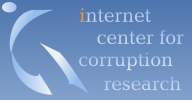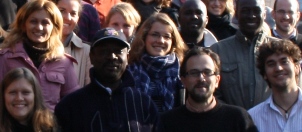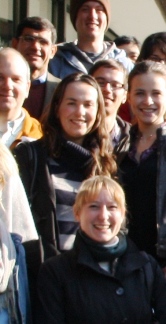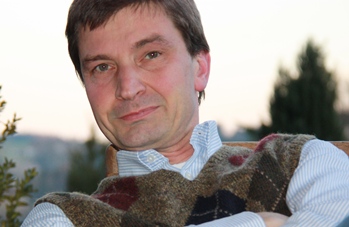
| Home → Lecture and Workshops → 2012 Passau |  |
|
|
The 2012 Economics of Corruption will focus on experimental and behavioral approaches to anticorruption.
It is particularly directed towards PhD and Master-students who want to deepen their studies and share exchange on
recent research. Findings from the lab and the field are surveyed, linked to survey-data and confronted with theory.
Interactive tools such as games, poster presentations and case studies involve participants
and make them acquainted with today's challenges. Prof. Johann Graf Lambsdorff and his team have spearheaded models for reform related to such issues as
contract penalties, compliance systems, debarment, procurement, leniency and corporate liability. Participants are introduced into this body of research.
They work in groups to develop and implement their own experiments and discuss their findings.
PhD-students are invited to present their findings (theoretical or empirical) in the form of a poster-presentation.
This international event is offered on a pro bono basis. There is no tuition fee. It is directed towards graduate and post-graduate students and faculty in the social sciences. |

Time: October 6-13, 2012
Program: The program is available here.
This year three guest lectures by outstanding experts on behavioral and experimental corruption complement the program:
Prof. Dr. Bernd Irlenbusch, University of Cologne, Germany, "Moral Hypocrisy"
The event consits of guest presentations by selected experts, case studies, group discussion, games and poster presentations. The course is restricted to successful applicants (information see below).
For registration please send an email to Mrs. Maxie-Lina Mehling.
Venue: University of Passau, Germany
Requirements: PhD-students and advanced scholars are invited to present a poster covering their latest research or findings from an anticorruption project, theoretical model, field study or laboratory experiment. More information on the poster presentations is available here.
Prospective participants must apply by completing the application form. 40 participants have already successfully registered for the event (23 students from Passau and 17 external participants, mostly PhD-students). The deadline has been extended until Sep 10, 2012 to allow for a limited number of 5 more participants. Please send your application to Ms Maxie-Lina Mehling.
The excellence of the application is judged on the academic background, motivation and, if submitted, the quality of the poster presentation. No limits are put on methodology or academic disciplines. Posters can be empirical, theoretical, experimental or of more practical relevance.
While participation is free of charge, we do not provide funding for travel or lodging. Course material will be made available online. Ca. 20 EUR will be collected to cover two evening events.
Exam: A final exam is offered on October 18, 2012, from 2-4 p.m. Students receive 5 ECTS credit points, based on group work (50%) and the exam (50%).
Accommodation: The City of Passau provides all ranges of accommodation. A list of selected hotels including prices and contact information is available here (Excel-File). You may also go the webpages of the Passau Tourist Information. Participants are asked to arrange accommodation on their own.
We are asking students from Passau to volunteer in making guest rooms at their apartments available. Please indicate your willingness to offer or request such an opportunity.
|
- Lambsdorff, J. Graf (2007) "The New Institutional Economics of Corruption and Reform: Theory, Evidence and Policy". Cambridge University Press
- Lambsdorff, J. Graf (2009), The Organization of Anticor-ruption - Getting Incentives Right. In: Corruption, Global Security, and World Order, ed. by R. Rotberg, (The Brookings Institution Press: Washington, D.C., 2009): 389-415.
- Serra, D. and L. Wantchekon (eds.) New Advances in Experimental Research on Corruption, Research in Experimental Economics volume 15, Emerald Group Publishing.
| Dr. Amadou Boly, United Nations Industrial Development Organization, Vienna, | "External Validity of Corruption Experiments" |
| Prof. Dr. Bernd Irlenbusch, University of Cologne, Germany, | "Moral Hypocrisy and the Use of (Un)Fair Decision Procedures" |
| Prof. Dr. Danila Serra, Southern Methodist University, Dallas, USA, | "Anti-Corruption Policies: Lessons from the Lab" |
| Name | Nationality and Affiliation | Position | Poster |
| Monday, Oct. 8, 2012, 16:00-17:45 | |||
| Behnud Mir Djawadi | German, University of Paderborn | PhD candidate | “The impact of risk perception and risk attitudes on corrupt behavior:Evidence from a petty corruption experiment” |
| Dominic Spengler | German, University of York, UK | PhD candidate | Endogenous Detection of Collaborative Crime: The Case of Corruption |
| Elina Khachatryan | Armenian, University of Bonn | PhD candidate | Combating petty corruption with positive feedback?- Experiment |
| Pieternella Pieterse | Dutch, University of Limerick, Ireland | PhD candidate | Tackling quiet corruption in the African health sector |
| Samuel Clark | Australian, University of Oxford, UK | PhD candidate | Courting Corruption: The Logic of Local Corruption Prosecutions in Post-Suharto Indonesia |
| Tugba Arik- Erdinc | German, Saxion University of Applied Sciences, Netherlands | PhD candidate | The psychology of flexible employment relationships and its impact on corruption |
| Nikita Krugljakov | German, University of Maastricht | PhD candidate | Social Closure and Social Norms |
| Friday, Oct. 12, 16:00-17:15 | |||
| Martin Acht | German | PhD candidate | Corruption and the Effects of Democracy |
| Eliska Drapalova | Czech | PhD candidate | Cheating on Democracy: When Politics is Business and Business is Politics in European Local Government |
| Alba Jasini | Albanian | research assistant | Education Specific Corruption in the Western Balkans |
| Ruth Nieffer | Swiss | research assistant | HONEST – Development of an integrated training tool concerning corruption prevention aimed at young professionals |
| Fola Malomo | Nigerian | PhD candidate | Factors Driving Informal Payments Amongst Firms: Evidence From Nigerian Business Surveys |


